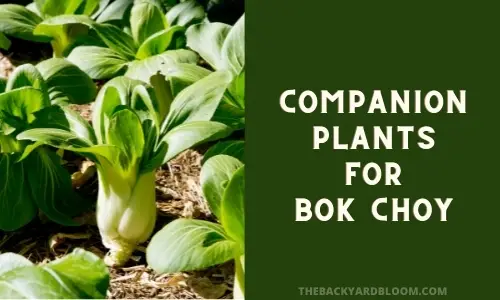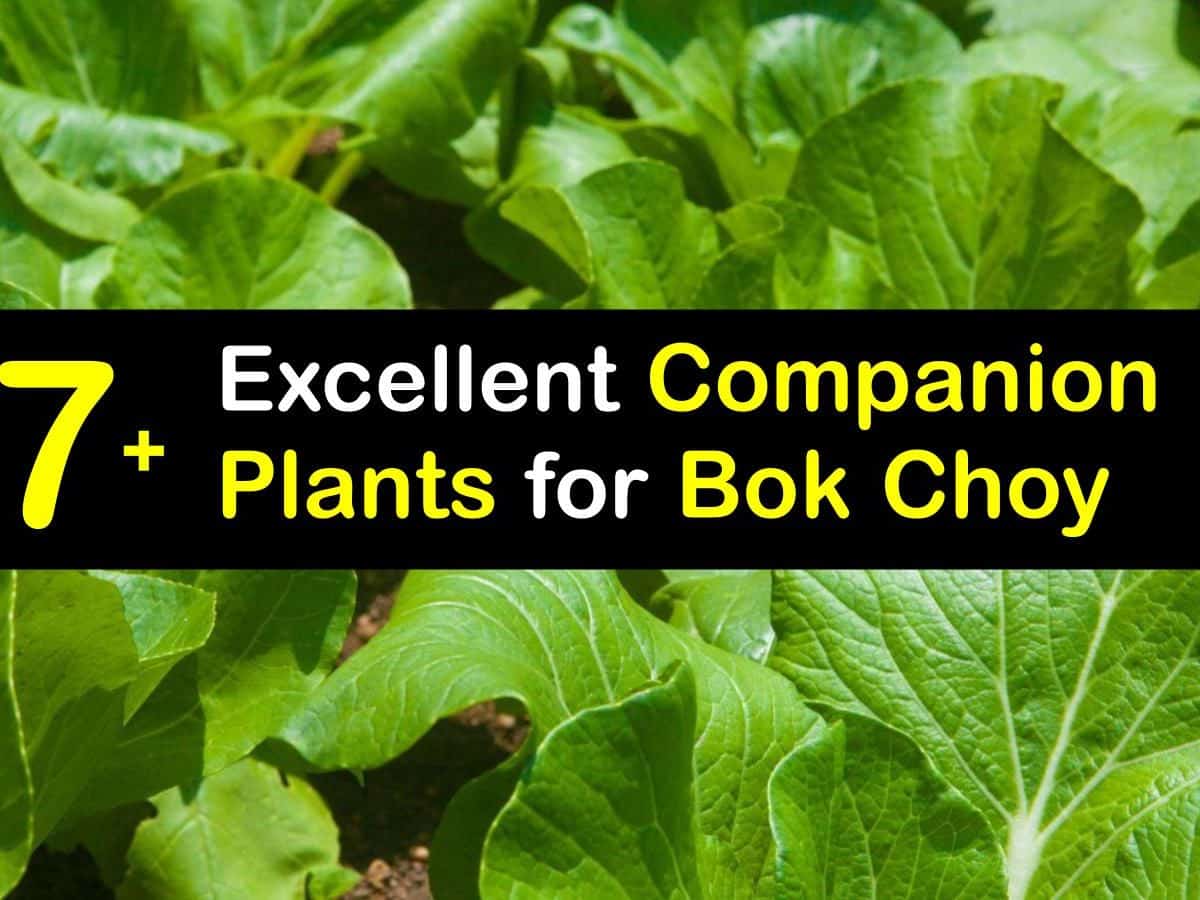The Ultimate Guide To Companion Planting For Pak Choy
The Ultimate Guide to Companion Planting for Pak Choy
Pak choy is a delicious and versatile vegetable that is easy to grow. It is a member of the brassica family, which means that it has some similar growing requirements to other vegetables in this family, such as broccoli, cabbage, and kale. However, pak choy also has some unique characteristics that make it a good candidate for companion planting.
In this blog post, we will discuss the best companion plants for pak choy, as well as some plants that should be avoided. We will also provide some tips on how to use companion planting to improve the growth and productivity of your pak choy plants.
What is Companion Planting?
Companion planting is a gardening technique that involves planting different types of plants together in order to promote their growth and deter pests. By carefully selecting the plants that you grow together, you can create a harmonious ecosystem in your garden that will benefit all of your plants.
There are many different benefits to companion planting. For example, some plants can help to attract beneficial insects, while others can help to repel pests. Some plants can also help to improve the soil quality, or provide shade or windbreaks for other plants.
Best Companion Plants for Pak Choy
There are many different plants that can be good companion plants for pak choy. Some of the best include:
- Onions. Onions are a great companion plant for pak choy because they help to repel pests such as aphids, cabbage moths, and flea beetles. They also help to improve the flavor of pak choy.
- Beans. Beans are another great companion plant for pak choy because they help to fix nitrogen in the soil. This means that they can help to improve the nutrient content of the soil, which can benefit pak choy plants.
- Carrots. Carrots are a good companion plant for pak choy because they help to repel root-knot nematodes. These nematodes can be a major problem for pak choy plants, so planting carrots nearby can help to protect your pak choy from these pests.
- Peas. Peas are a good companion plant for pak choy because they help to attract beneficial insects such as ladybugs and hoverflies. These insects can help to control pests such as aphids and cabbage moths, which can benefit pak choy plants.
- Lettuce. Lettuce is a good companion plant for pak choy because it helps to suppress weeds. Weeds can compete with pak choy plants for water and nutrients, so planting lettuce nearby can help to reduce the amount of weeding that you need to do.
Plants to Avoid
There are a few plants that should be avoided when companion planting with pak choy. These include:
- Tomatoes. Tomatoes are a member of the nightshade family, and they can attract the same pests as pak choy. Planting tomatoes near pak choy can increase the risk of pest infestation.
- Broccoli. Broccoli is another member of the brassica family, and it can compete with pak choy for nutrients. Planting broccoli near pak choy can stunt the growth of both plants.
- Peppers. Peppers are also members of the nightshade family, and they can attract the same pests as pak choy. Planting peppers near pak choy can increase the risk of pest infestation.
Tips for Companion Planting with Pak Choy
When companion planting with pak choy, there are a few things to keep in mind:
- Plant the companion plants in close proximity to each other. This will help to maximize the benefits of companion planting.
- Choose companion plants that have similar water and nutrient requirements. This will help to ensure that both plants get the resources they need to thrive.
- Monitor your plants closely for signs of pests or diseases. If you see any problems, take steps to address them immediately.
Conclusion
Companion planting is a great way to improve the growth and productivity of your pak choy plants. By carefully selecting the plants that you grow together, you can create a harmonious ecosystem in your garden that will benefit all of your plants.
Pak choi is a delicious and nutritious vegetable that is easy to grow. But did you know that there are certain companion plants that can help to improve its growth and flavor?
Some of the best companion plants for pak choi include:
- Beets. Beets help to improve the soil's nitrogen content, which is beneficial for pak choi.
- Bush beans. Bush beans fix nitrogen in the soil, which can help to improve the growth of pak choi.
- Carrots. Carrots help to suppress weeds, which can help to keep pak choi healthy.
- Celery. Celery helps to attract beneficial insects, which can help to control pests.
- Cucumbers. Cucumbers help to attract pollinators, which can help to improve the pollination of pak choi.
For more information about companion plants for pak choi, I recommend visiting the website Gardenia Inspiration. This website has a comprehensive list of companion plants, as well as information about the benefits of companion planting.
FAQ of companion plants for pak choi
Question 1: What are some good companion plants for pak choi?
Answer: Pak choi is a cool-season vegetable that does well when planted near other cool-season crops. Some good companion plants for pak choi include:
- Beets: Beets help to suppress weeds and improve the soil structure.
- Bush beans: Bush beans fix nitrogen in the soil, which is beneficial for pak choi.
- Carrots: Carrots help to deter pests from pak choi.
- Celery: Celery helps to attract beneficial insects to the garden.
- Cucumber: Cucumbers help to shade pak choi from the hot sun.
- Dill: Dill helps to repel pests from pak choi.
- Garlic and onions: Garlic and onions help to repel pests from pak choi.
- Potatoes: Potatoes help to suppress weeds and improve the soil structure.
Question 2: What are some bad companion plants for pak choi?
Answer: Some bad companion plants for pak choi include:
- Broccoli: Broccoli is a member of the Brassica family, and planting it near pak choi can cause the pak choi to bolt.
- Cabbage: Cabbage is a member of the Brassica family, and planting it near pak choi can cause the pak choi to bolt.
- Cauliflower: Cauliflower is a member of the Brassica family, and planting it near pak choi can cause the pak choi to bolt.
- Kale: Kale is a member of the Brassica family, and planting it near pak choi can cause the pak choi to bolt.
- Peppers: Peppers are members of the nightshade family, and planting them near pak choi can stunt the growth of the pak choi.
- Tomatoes: Tomatoes are members of the nightshade family, and planting them near pak choi can stunt the growth of the pak choi.
Question 3: Why is it important to plant companion plants with pak choi?
Answer: Companion planting is a gardening technique that involves planting different types of plants together to benefit each other. When companion plants are planted together, they can help to:
- Attract beneficial insects: Beneficial insects, such as ladybugs and lacewings, help to control pests in the garden. Companion plants that attract beneficial insects include dill, fennel, and yarrow.
- Suppress weeds: Some companion plants, such as beans and peas, help to suppress weeds by fixing nitrogen in the soil.
- Improve soil structure: Some companion plants, such as carrots and celery, help to improve soil structure by breaking up compacted soil and adding organic matter.
- Deter pests: Some companion plants, such as garlic and onions, help to deter pests from the garden.
Question 4: How far apart should pak choi plants be planted?
Answer: Pak choi plants should be planted about 12 inches apart. This will give the plants enough room to grow and mature properly.
Question 5: When should pak choi be planted?
Answer: Pak choi can be planted in the spring or fall. The best time to plant pak choi depends on your climate. In cool climates, pak choi can be planted in early spring or late fall. In warm climates, pak choi can be planted in the spring or summer.
Image of companion plants for pak choi
5 different images of companion plants for pak choi from Pinterest:
- Carrots
 Carrots and pak choi are both cool-season crops that can be planted together in the same garden bed. Carrots help to suppress weeds, while pak choi helps to deter pests such as cabbage worms.
Carrots and pak choi are both cool-season crops that can be planted together in the same garden bed. Carrots help to suppress weeds, while pak choi helps to deter pests such as cabbage worms. - Celery
 Celery and pak choi are both members of the Apiaceae family, so they have similar growing requirements. They can be planted together to help attract beneficial insects, such as ladybugs and lacewings, which help to control pests.
Celery and pak choi are both members of the Apiaceae family, so they have similar growing requirements. They can be planted together to help attract beneficial insects, such as ladybugs and lacewings, which help to control pests. - Cucumbers
 Cucumbers and pak choi can be planted together to help improve the flavor of both vegetables. The cucumbers help to shade the pak choi, which can help to prevent it from bolting.
Cucumbers and pak choi can be planted together to help improve the flavor of both vegetables. The cucumbers help to shade the pak choi, which can help to prevent it from bolting. - Dill
 Dill is a good companion plant for pak choi because it helps to repel pests such as aphids and cabbage moths. Dill also helps to attract beneficial insects, such as hoverflies and parasitic wasps, which help to control pests.
Dill is a good companion plant for pak choi because it helps to repel pests such as aphids and cabbage moths. Dill also helps to attract beneficial insects, such as hoverflies and parasitic wasps, which help to control pests. - Onions
 Onions and pak choi are both good companion plants for each other. They help to deter pests such as cabbage worms and aphids, and they also help to improve the flavor of each other's vegetables.
Onions and pak choi are both good companion plants for each other. They help to deter pests such as cabbage worms and aphids, and they also help to improve the flavor of each other's vegetables.
Post a Comment for "The Ultimate Guide To Companion Planting For Pak Choy"